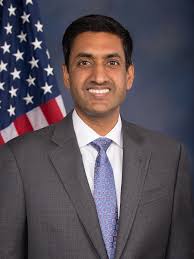
Introduction
Ro Khanna, a Democratic Congressman representing California’s 17th congressional district, has emerged as a significant force in American politics. His advocacy for progressive policies and his role in addressing contemporary issues such as technology regulation, climate change, and economic inequality have captured national attention. With the increasing polarization in Congress, Khanna’s approach aims to bridge divides and promote a new narrative for the Democratic Party.
Background
First elected in 2016, Khanna has consistently championed a progressive agenda that resonates with younger voters and those advocating for systemic reform. As a former Deputy Assistant to President Obama, Khanna combines his academic background in economics, having graduated from the University of Chicago and Yale Law School, with his political experience to influence over key legislative outcomes.
Current Initiatives and Achievements
In recent months, Khanna has focused on issues like technology regulation and healthcare reform. He has been vocal about the need for more stringent regulations on big tech companies to protect consumer data and encourage competition. His legislation aims to ensure greater accountability and transparency in the tech industry, reflecting the concerns of many constituents.
Additionally, Khanna is a leading advocate for affordable healthcare and has worked towards lowering prescription drug costs. His proposals include allowing Medicare to negotiate prices directly with pharmaceutical companies, a move that has sparked considerable discussion within Congress. His commitment to environmental issues is also evident in his support for the Green New Deal, emphasizing a transition to renewable energy and sustainability.
Significance and Future Outlook
As a member of the House Committee on Oversight and Reform, Khanna’s influence is poised to grow, especially as the 2024 elections approach. His focus on grassroots movements and engagement with voters through town halls and social media is indicative of a new wave of leadership aimed at reinvigorating the Democratic base. Observers note that his ability to appeal to a diverse range of constituents while addressing critical global challenges positions him as a key figure in shaping the future of American politics.
Conclusion
Ro Khanna’s trajectory in Congress underscores the evolving landscape of U.S. politics amid significant challenges. His progressive stance and dedication to reform resonate with a generation looking for change, potentially influencing the direction of the Democratic Party moving forward. As the political climate shifts, Khanna’s role could become increasingly critical, making his actions worthy of close attention from constituents and political watchers alike.



